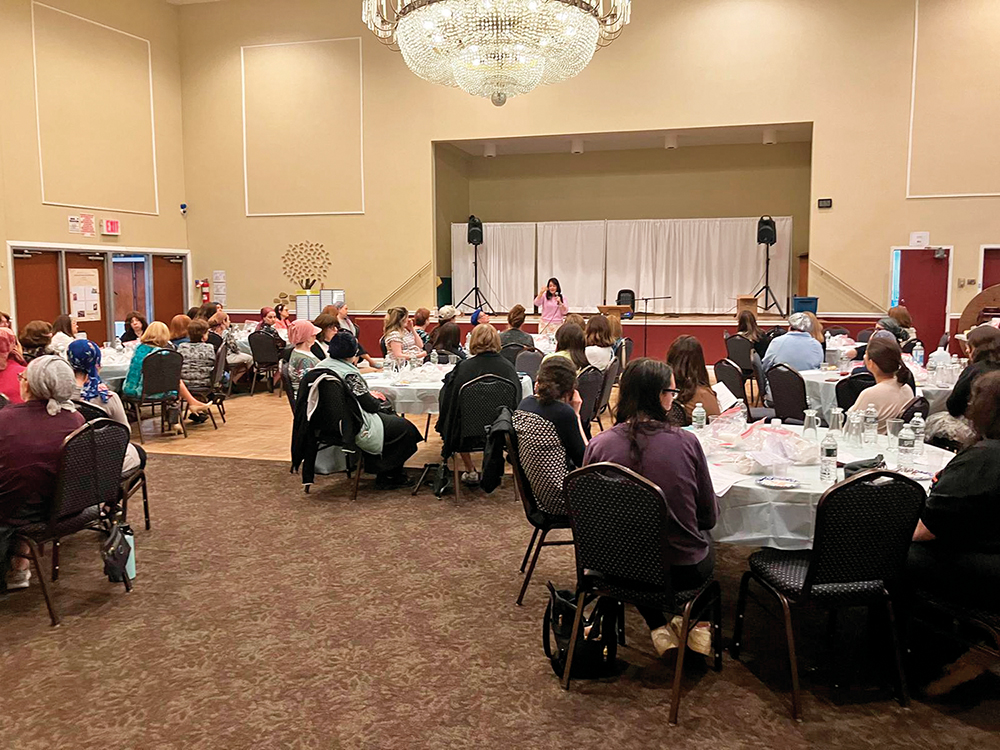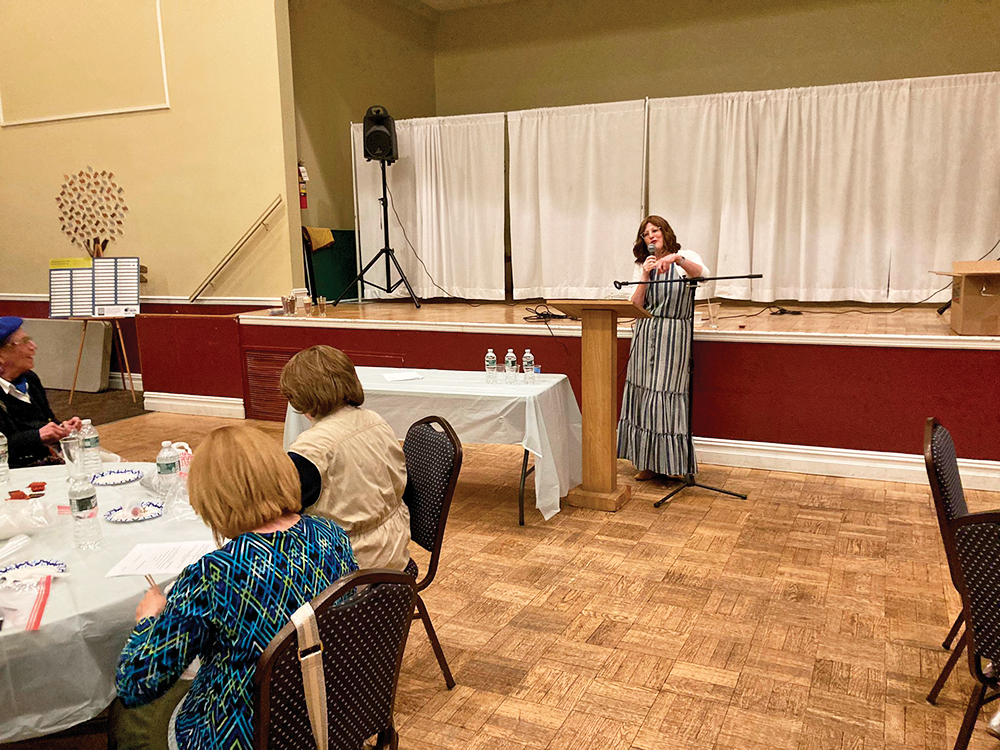
In the social hall at Mount Sinai Jewish Center in Washington Heights, on May 19, women from across the community sat down together for an evening of inspiration and camaraderie. But it wasn’t just any gathering: The event was in support of the Mikvah of Washington Heights, a long-standing community institution run by K’hal Adath Jeshurun (KAJ) and serving the area for over 80 years.
In a touching display of unity, women from the breadth of local synagogues—Mount Sinai, The Bridge Shul, The Beis Community, YU’s Shenk Shul and Glueck, Chabad, and of course, KAJ—volunteered their time to help create the event and raise funds for the mikvah. Not only was the evening a resounding success, but the Washington Heights community demonstrated yet again its ability to come together for things that matter.
Elisheva Kalinsky, one of the event’s many organizers and a Washington Heights resident for 24 years, opened the night’s festivities with her own reflections on what makes the community so special. “The people are real and genuine,” she said to the crowd, as many of the attendees nodded in agreement and smiled at one another. She then introduced longtime educator Esther Wein, the keynote speaker for the evening, who herself shared fond memories of Washington Heights during her countless visits to grandparents, including Rav Shimon Schwab, while she was growing up.
Wein gave a captivating class on the role of “counting” in Judaism, not only in relation to Sefirat HaOmer, but to the cyclical nature of keeping Taharat Hamishpacha. She focused on the number one, as a representation of our relationship with God, and connected the idea to the number 50, the culmination of this time between Pesach and Shavuot and a manifestation of the ultimate yearning for spirituality. Bringing examples from multiple sources, Wein engaged the audience with plenty of questions, while encouraging the crowd to ask questions of their own. It was clear from the dialogue that not only was the crowd curious and thoughtful, but they also came with diverse perspectives.

Chava Gordimer, a Washington Heights mikvah staff member and another event organizer, wrapped up Wein’s class by touching upon one of the points that she made: that people will always crave fulfillment in their lives. She related it to her own decision of moving to Washington Heights, “because I might have had everything I needed, but I still wanted something more”—a warm community with opportunities to give back and find fulfillment.
Gordimer also noted that Rabbi Dr. Joseph Breuer, the first rabbi of KAJ, established a mikvah as the very first community institution in Washington Heights. To Rav Breuer, there would be no community without a mikvah. As evident in the room that evening, that sentiment has remained since the mikvah’s establishment in 1943, with its existence still bringing together residents of all different backgrounds and serving a critical need for a Torah-oriented community.
The room came alive as Gillah Nettleton took the stage to run a candle-making workshop. While Nettleton demonstrated to the attendees how to make beautiful Havdalah candles, many of the event’s organizers and community volunteers reflected on the importance of having a resource like the Washington Heights mikvah.
“The Mikvah of Washington Heights is so important,” said Rebbetzin Racheli Taubes of Mount Sinai Jewish Center. “It’s so important for family life, and not just for couples, but to keep people connected to the community by creating easy access to this mitzvah. We need it to flourish and to thrive.”
Rebbetzin Taubes pointed out, as was also noted on the flyers across each table, that the mikvah runs on a deficit. While this is not unique to Washington Heights, it highlights the crucial need to run fundraisers like Sunday evening’s event—it’s what keeps the lights on.
Malka Spoerri has been heading the Washington Heights mikvah since 2021, and Sunday’s event was not only her first fundraiser in that role, but it was also the first in-person benefit in anyone’s recent memory. To Spoerri, the idea of creating a fundraiser was a daunting task, but she,of all people, knew the expense of keeping the mikvah running at all times. With the help of other community members, including Rebbetzin Taubes who was instrumental in gathering volunteers for the event, Spoerri assembled a total of 19 fundraiser organizers.
“Mikvah is a tough mitzvah for so many people, and it’s incredibly important for us to be sensitive to that,” Spoerri explained. “We really try to think of everything to make sure that everyone’s needs are met and that we create an atmosphere of comfort and belonging. Ultimately, that’s what makes us special…that we can serve everyone and meet them wherever they are.”
The unique challenge in this, Spoerri noted, is that a fundraiser for the mikvah has to be just as open and welcoming as the mikvah itself. So upon embarking on the planning process, she was incredibly conscious of the need to cater to all of the women of the Washington Heights community. Every decision centered on whether the event would be accessible and comfortable for those in attendance.
Rebbetzin Taubes echoed similarly that the organizers wanted to create an event which “just focused on friendships and on feeling good about the community,” especially considering that perhaps the mitzvah may not apply to the attendees in that moment. “I’m proud that Mount Sinai was able to host an event that brings everyone together like this, and I feel lucky that we live in a place where women from across the community can learn Torah together and raise money for a critical institution.”
Suzanne Mazel, a member of Mount Sinai and another organizer of the evening, described the mikvah as a “unifying institution,” especially given its sensitivity to everyone who walks through its doors. “At no point have I ever felt judged or uncomfortable, and I think that differs from the way my friends have felt at other mikvaot. Washington Heights is a very open and welcoming community that accepts people from all backgrounds while still maintaining the highest standards.”
“The nicest thing about tonight is that so many different parts of the community are coming together for a good cause…it’s so nice to see everyone can work together to ensure this community will thrive,” said organizer Nechama Rabinovitch.
Even for locals who don’t plan to be in Washington Heights in the long run—a situation in which many Yeshiva University families find themselves—the mikvah remains a critical part of their time in the neighborhood. That’s why N’Shei YU, the women who are affiliated with YU’s institutions like The Shenk Shul and Glueck, became decidedly involved with fundraising for the mikvah as well. “What you invest in when you are in a place, even for a short amount of time, will maximize your experience there,” said Devorah R. “We realize this is an important part of our lives and we need to be a part of it.”
At the end of the event, Rebbetzin Taubes gave closing remarks thanking all of those who helped plan and those who run the Washington Heights mikvah, including Spoerri and Gordimer, as well as the supervising rabbis from KAJ: Rav Yisroel Mantel and Dayan Yaacov Posen.
As longtime Washington Heights resident, member of KAJ and event organizer Naomi Hellmann noted to The Jewish Link: “Ultimately, the mikvah is the link between all of our respective communities.” And Sunday’s fundraiser made that crystal clear.
To donate to the Washington Heights mikvah, visit: https://bit.ly/wh-mikvah
Channa Fischer is digital editor of The Jewish Link and is the resident 20-something in the office. She lives in Washington Heights.












